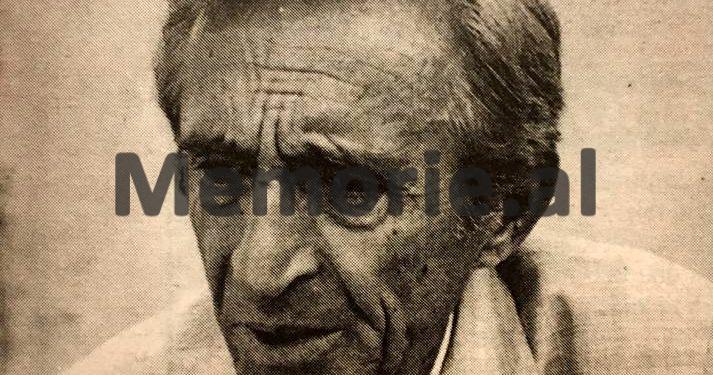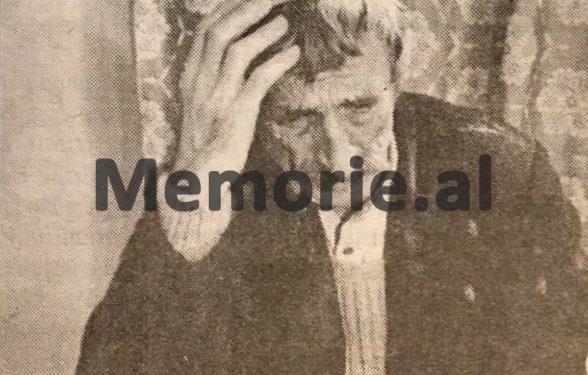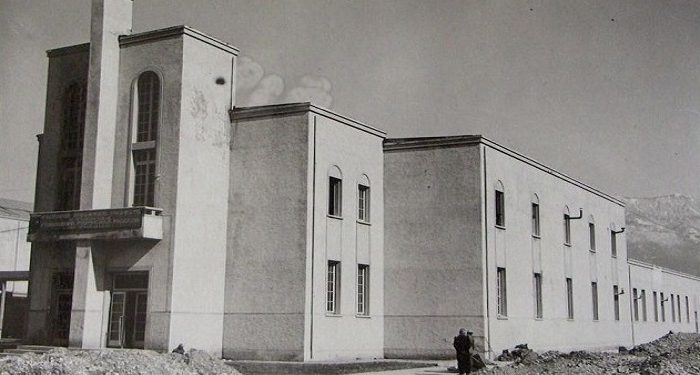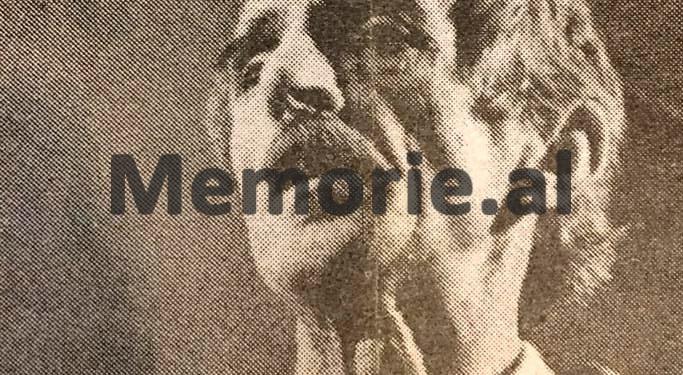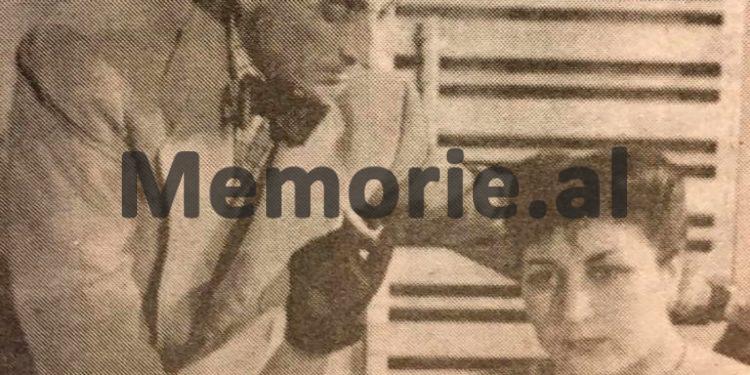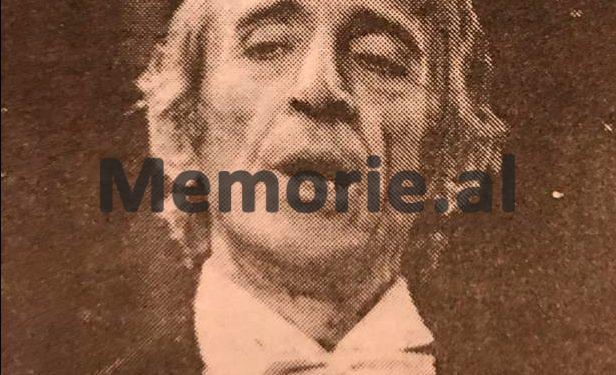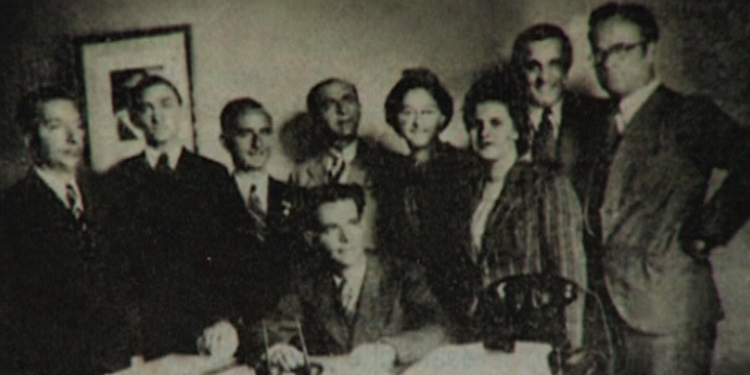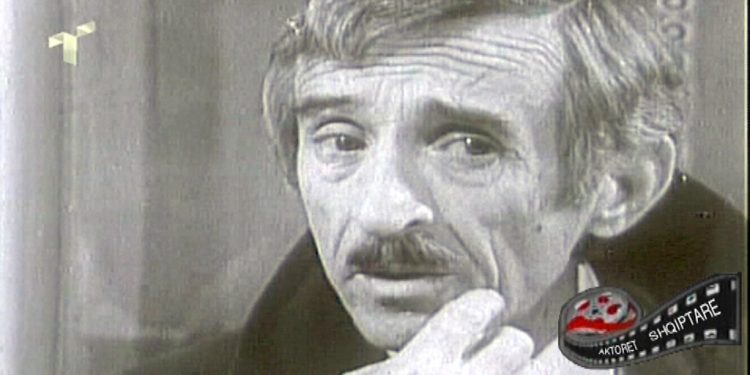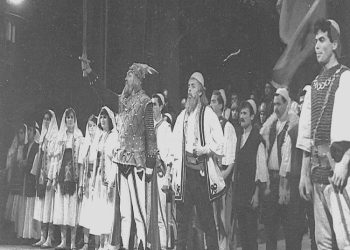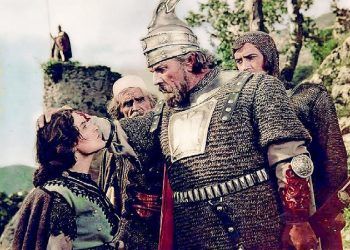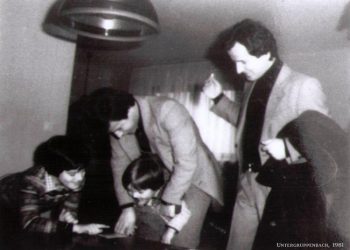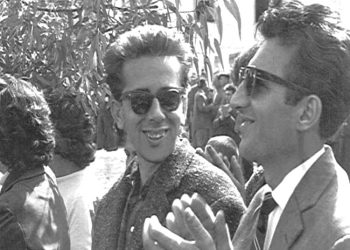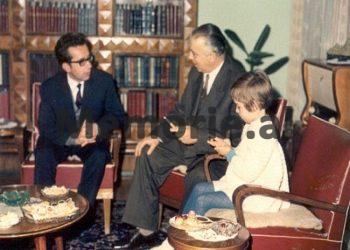Dashnor Kaloçi
Memorie.al publishes the unknown story of the great actor of Albanian theater and cinematography, Prokop Mima, which in the period of the Zog Monarchy the family had sent to study Pharmacy, in Padua, Italy, but after three years of study, he was forced to return to his homeland without obtaining a diploma, after being given to movies, music, entertainment, and guitar, in the company of friends and family of the world-famous Albanian-American actress and singer, Eleni Qirici, originally from Korça. The rare testimonies of his wife, Eleni Karalliu Mima, brother, Miltos, brother-in-law, Robert Zhvarc, poet Koçi Petriti, as well as the director and great actor of Albanian cinema, the late Rikard Ljarja, etc., for “The Prince of the Artistic Word “, Starting from the period of the War on Radio-Tirana where he realized the show” Happy Hour “with the great Pjetër Gjergji, the arrest by the communists in November ’44 together with his close friend, Sander Prosi, accused As members of the Balli Kombëtar Youth, his release from prison and his return to Radio Tirana, where he and his two partners, Besim Levonja and Behije Çela, continued “Happy Hour”, a long career in theater and cinematography, the incident in Kosovo that will It cost him a lot, as he proposed raising a toast to Nexhmije Pagarusha and retiring in 1976, at the height of his career, from where he was severely murdered spiritually and locked himself inside. of his house, taking care of the flowers, until he passed away in 1986 after Manush Myftiu “could not” take him out for treatment… ?!
After leaving behind the square “Avni Rustemi” on the right side of the road that leads to the eastern part of the city of Tirana, surrounded by several buildings built during the period of “socialist realism”, in the middle of a garden surrounded by flowers and walls high, is the home of the Mima family, built there in the mid-1930s. Although that old house is somewhat hidden from the palaces, it seems as if it will suffocate, and the great actor has not lived for 35 years, if you ask him, it is not very difficult to find him. Almost all the residents of that neighborhood wave to her and as a sign of respect for that family are ready to accompany her to the gate 170. The Mima family had been living in that house since 1928, when Dhimitri (Father of Prokopit) an employee of “Banka di Roma” who was raised at that time in the city of Durrës, set up its branch in the capital. But who was Prokop Mima, where did he study and what was his past? How did he get into the path of stage art, what were some of the vicissitudes he encountered during his artistic career until he retired? In this regard, we know the testimonies of his wife, Eleni Karalliu, brother, Miltos, brother-in-law Robert Zhvarc, as well as the director and great actor of Albanian cinema, the late Rikard Ljarja, whom we took a few years ago.
Pharmacy student in Padua
Prokopi was born in the city of Durrës in 1920 and was the first child of two sons and three daughters in that family. After receiving his first lessons in his hometown, Prokopi continued them in Tirana, near the classical gymnasium in 1938. After finishing school in the summer of that year, he returned to the city of Durrës, where his father’s family continued to live… The reason for returning to the city of Durrës was that the Mima family owned a pharmacy, and none of that family had the proper degree to work there. Prokopi was chosen by his father’s family to go to study Pharmacy at the University of Padua, Italy, after gaining a study right from the government of the Zog Monarchy where Mehdi bej Frashëri was prime minister. In September 1938, escorted by his relatives to the port of Durres, 18-year-old Prokopi set off for Italy. In the auditoriums and laboratories of that university, he stayed for three years, but, unable to return to Albania with the pharmacist’s diploma in his pocket, for which the family had sent him specially. The young Procopio and with the passions of age were given the whole after movies, theaters, and music with the guitar he had learned and lunate as a true professional, thus somewhat neglecting the lessons of pharmacy. At that time, he made a close friendship with the family of the famous actress Eleni Qirici, from the city of Korça, who gave various performances in Italian cities. He, under their company, spent the evenings with them under the magical sounds of guitar and Korça serenades, with a great sense of nostalgia for his country that had time without seeing it. Thus, in July 1941, Prokop returned to the city of Tirana, near his family, from where he had been away for nearly three years.
Arrested by communists
After returning to Tirana, Prokopi was busy with some kind of work to help his family, but without forgetting for a moment his passion for cinema and theater. So at that time, with the help of two or three of his friends who worked at Radio Tirana, he was able to get there and work for a long time, doing various shows. After returning from Italy, Prokopi became active with the choir of the Orthodox Church in Tirana, which helped him a lot to start working at Radio Tirana. Towards the end of 1942, Prokopi and his close friend Sander Prosi were summoned by the nationalist youth of Tirana (Mit’hat Frashëri’s sympathizers) to perform in the “Wilhelm Tell” section, which they were preparing to perform. The rehearsals for this show took place in the “Rex” cinema under the auspices of Fiqiret Fterë, who had taken on the role of director. The call that the nationalist youth of Tirana made to Prokop and Sandri was not simply due to their talent, but because they were both sympathizers of that political group and spent a good part of their time in that social circle. This would be the main reason for his arrest (which he would suffer for the rest of his life) by the communists, a few days before the liberation of Tirana. In this regard, his brother Milto said: “It was the end of October 1944, although the struggle for the liberation of Tirana was not over, the eastern part of the city was free and completely controlled by the partisans. Some partisans (officers with ranks) came to our house and asked Prokop, ‘We have little to do with him for an explanation, and again he will return home,’ they said. But he did not return, as he was tied up and isolated on Dajti Mountain, where the partisans had several newspapers, which they had adopted as a prison. Many of the former high-ranking politicians and military personnel who had served in King Zog’s government during the occupation of the country were isolated at that time. A few days after the end of the war, they all went down to Tirana and sent them to the “Old Prison” (today Mine Peza). Prokopi was one of the last to go to that prison, and in those days he was released because they could not find compromising evidence for him. ” According to Miltos, the real reason for Prokop’s arrest was not only the suspicion they had of him as a participant in Balli Kombëtar’s nationalist youth, but also the fact that a relative of theirs, (Jovan Mima), had taken part in Balli youth and were killed in the struggle with the partisan forces, sometime in mid-1944, in the Preza war.
On Radio Tirana and the People’s Theater
After the end of the war, at the request of his comrades who worked at Radio Tirana, Prokopi was called to work again in the place where he had worked during the war. Pjetër Gjergji, originally from Shkodra, gave him a great help. Also, with the creation of the People’s Theater, in 1945, Prokopi was one of the first to create his nucleus together with Besim Levonja, Gjon Karma, Loro Kovac, etc. At that time, on Radio Tirana, Besimi, Behije Çela, and Prokopi performed the well-known comedy show, called “Happy Hour”. This show lasted for nearly three years and was very well received by the listeners of that time. In the early postwar years, Procopius was a member of the State Council (along with his brother, Milton, and his sister Pauline) and toured several parts of Eastern Europe. After the arrival of the famous Soviet director Kirichkov, near the People’s Theater, Prokopi was one of those who gained his trust and great help. Although he was not sent abroad to pursue higher studies in dramatic art like many other colleagues (for biographical reasons), with a great will and perseverance, studying himself, he managed to become one of the main pillars of the theater, gaining the right to many roles, which stood out for his special character and portrait. From the beginning of 1951, Prokop was taken to perform compulsory military service in a labor ward. After the end of the army, he was no longer accepted at the People’s Theater, “due to lack of space”. So, in order not to be detached from the stage, he agreed to go to Gjirokastra, where he would set up the Estrada of that city. In this regard, his wife, Eli Karalliu, recalled: “Then, when Prokopi came to Gjirokastra to help set up the Professional Variety Show, we met. I was in amateur groups and there we connected. Although he came there for a day, he stayed much longer and it took the intervention of Bedri Spahiu (Minister of Education and Culture) for him to return to Tirana, near the People’s Theater in 1954 ”.
Rikard Ljarja: Kopi was the “Prince” of the artistic word
Since the establishment of the Higher Institute of Arts in 1958, Prokopi was one of the first professors to be called upon to teach at that school. For many years until he retired, he gave the students a “stage speech”, which would not only be enough for what he gave in the classrooms and auditoriums of the Institute but also in his home. Regarding this, his wife, Eli, said: “Procopius was an indefatigable man with an admirable will. In addition to preparing for the roles he played for his roles, he was always accompanied by students at home who taught him diplomas, or those who wanted to compete for the Institute. He worked very patiently with them, spending a lot of time. One of those students that Prokopi has worked hard for is Mario Ashiku. One of the most famous directors and actors of Albanian cinema, the late Rikard Ljarja, said: “Prokopi was really a great master of the word. Professional ethics in this regard went as far as scrupulousness and matched his own ethics. He never let you eat the word, as is often done today by many actors. This is what he often told us: Every letter has a right to exist. One of the greatest “assets” that Procopius had and that made him a true master, perhaps irreplaceable in its gender, was the recitation of the artistic word, which, as his colleagues say, “he elevated that art to art” and he was called the “Prince” of the artistic word. In this regard, the well-known poet, Koçi Petriti, recalled: “I was lucky enough to work with Prokop Mima because he chose to recite some of my poems. He never took them for recitation mechanically. He studied them deeply and often called me to arrange a verse that did not go. He came to Librazhd for such a thing and asked me. ”
Incident in Kosovo
In the early 1970s, during a tour of the People’s Theater in Kosovo, Prokopi participated with one of his accomplished roles, that of Dom Marku, in “Cuca e Maleve e Loni Papës. During a dinner hosted by Kosovar artists in honor of their brothers from their homeland, Prokopi stood up and proposed setting up a toast to the famous singer Nexhmije Pagarusha, who was singing that evening to honor artists from Albania. After Prokop’s words about Pagarusha’s toast, the escorts of the Albanian delegation got angry and kicked him under the table, so that he would not speak. This cost him a lot because before that dinner was over, the escorts of the delegation with the tricks pulled him aside and said: “Don’t you know, that we raise the toasts only for the party and Enver’s friend” ?! Regarding this event, his wife, Eli, told us: “In the second tour that group would do in Kosovo, Prokop was not planned. He was replaced by another actor. He got very tired, going several times to the state administration offices to fix that. He was eventually allowed to go, but his role was further interpreted by that other actor. That toast, Procopius was given an “earring” and was often remembered. Prokop was retired in 1976 when he was at the height of his acting career and acting skills. He left the stage of that theater indignant, where he had played more than 80 roles “, his wife recalled, for the end of Prokop’s career. Among his most accomplished roles is Zbisheku, in “The Morality of Mrs. Dulskaja ”, Dom Marku in“ Cuca e Maleve ”, the German general in“ The General of the Dead Army ”, Xhivola in“ Arturo Ui ”and Stefan Ahurja in the TV movie“ Emblema e dikëshme ”(realization of the Albanian Radio-Television), etc. Regarding the role of Zbishek, the well-known director, Mihallaq Luarasi, said: “Mima’s Zbishek is an original embodiment. With that role, Mima recently proved his talent and the subtle sense of smell of the author’s style, giving us an acting creation that will not be easily forgotten.
Forgotten…
Shortly after Prokopi retired, the People’s Theater staged Brecht’s “Arturo Ui”. They were forced to call Procopius to reconvene Xhivola. Related to this, the late director and actor, Rikard Ljarja, his former student, recalled: “When the time came for Kopi to come on stage, the hall burst into applause. The large audience had felt his departure from the stage, and as seldom in any work, his role in “Jivola” was played so skillfully that it eclipsed the lead role of that drama. ” From 1976, when he retired, until 1986 when his great mastery passed away, he locked himself inside his house, unable to bear the forced departure from the theater. According to his wife’s testimony, a few of his friends and colleagues visited him at home. Only Dhimitër Anagnosti and his wife, Roza, often came to see him, and Ndrek Luca never forgot him. For those ten years, Prokopi stayed at home, dealing with books and flowers, his old passion “, Eleni recalled. In this regard, his brother, Milto, recalled: “Back in the 1960s, I remember a time when my mother felt that someone had entered our yard at night. I loaded the shotgun we had at home (the couple) and went out from behind the apartment to see. When I opened the gate, what could I see: Procopius with a lighted candle in his hand was checking the branches of the roses from a worm that was biting them at night. In addition to the passion for flowers, which he knew all their Latin names, his house has been a “real botanical garden”, he rarely goes fishing, with some of his theater friends and colleagues. By the end of 1985, Prokopi was seriously ill with a heart attack. Despite the intervention of his brother-in-law (Robert Zhvarc) with the secretary of the Central Committee of the ALP and member of the Politburo, Manush Myftiu, to bring him abroad for treatment, this was not possible. He passed away at his home on August 18, 1986, and no official state representative attended his funeral.
Spruce in the yard of the National Theater
Poems by Robert Zhvarc
(I return to Prokop Mima)
Your whole life
your whole life so long
so short brother-in-law,
remains a spruce, somewhere in the North acar,
a strong spruce,
straight like a candle
dreaming of another fate
maybe that palm in hot places
perhaps that Mediterranean sky,
that our sun that your sun,
under which they did not want to leave a place…
And now that you are no more,
Now that they died prematurely
and the boards of your stage so dear
they turned them into coffin boards-
now a noble spirit
to uproot from oblivion
and out of ingratitude
and from envy
and rape
and immortalized you again
on a spruce
according to the sacred rite
of the ancient Romans
and of today’s Jews!
There you are again brothers-in-law,
Near your stage
Near your crystal clear vocabulary
of our masculine language
Near your flowers that were
I loved you, great love,
near your life,
among your friends.
You’re there again,
simple and greedy
Wreath titles-
And you will become
a tall spruce
right
as it was in life.
Memorie.al




